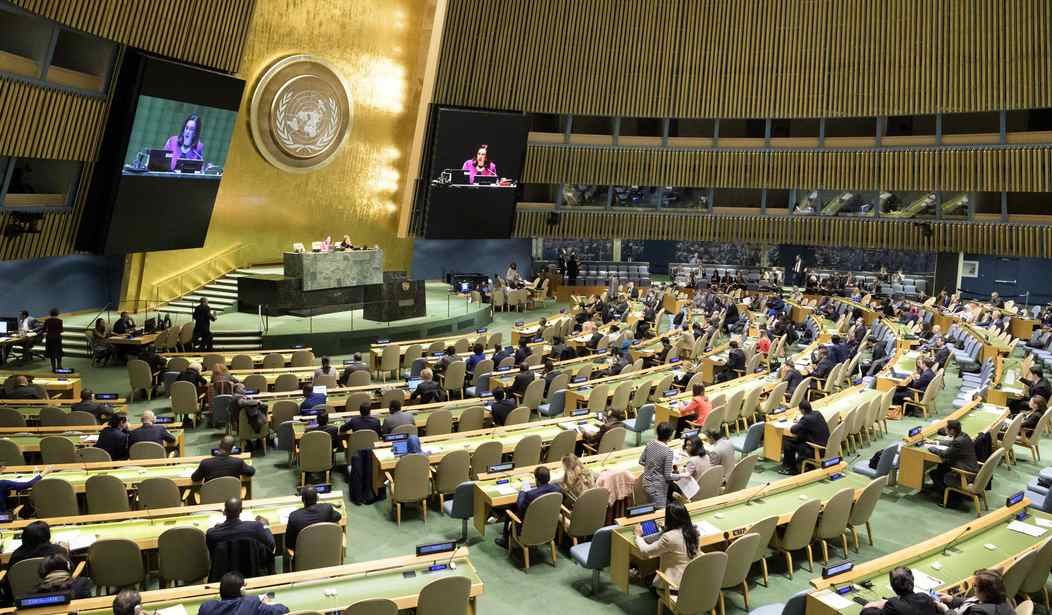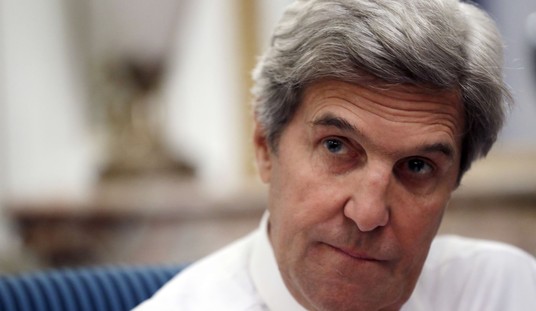Their masters did not love them and planned to replace them with other peoples.
—Renaud Camus, Ørop
The verses of the medieval Persian poet Saadi Shirazi, Bani Adam, or “Children of Adam,” are sewn into a carpet with golden thread and prominently displayed at the UN headquarters in New York. A gift from the Islamic Republic of Iran in 2005 in a gesture of ineffable irony, the poem's sentiment of unity and compassion between all human beings was meant to convey the ostensible spirit of the United Nations' Universal Declaration of Human Rights, the concept of the Dialogue among Civilizations, and the quest for a borderless world. A loose translation of the verses reads:
Bani Adam
All of the sons of Adam are part of one single body
They are of the same essence.
When time afflicts us with pain
In one part of the body
All the other parts feel it too.
If you fail to feel the pain of others
You do not deserve the name of man.
The poem has been interpreted by delegates at the UN and apparatchiks in many governments to justify the acceptance of illegal migrants by the hundreds of thousands or millions, in addition to the legal importation of multitudes from Third World countries. The citizens of Europe and North America have been told repeatedly, directly or indirectly, that they must not refuse those afflicted "with pain." If they fail to heed “the pain of others," they are fascists, far-right, inhuman.
This interpretation has ignored the pain of those who have seen their own countries transformed by mass immigration, which has increased crime, social division, fear, and economic immiseration. Their pain, in seeing the ways and usages of their country disrespected and destroyed, does not register with those who profess such love for the "children of Adam."
These verses may also be challenged and adapted by conservative thinkers and politicians to defend their own citizens from the destructive and conquering effect of interlopers from abroad exploiting the resources — economic, educational, medical, and cultural — of the host nations.
In fact, the solicitude for others affected by the majority of UN delegates and state actors is plainly counterfeit, a deceptive expression of ulterior motives involving calculations of profit, surreptitious political agendas, the inflaming of ancestral hatreds, the pursuit of global hegemony, and other invidious purposes and programs such as those venerable canards climate change, pandemic preparedness, and open borders.
Regarding the latter, French political philosopher Renaud Camus has charted the “great replacement” of European peoples by Third World migrants and immigrants in “our mad embrace of a posthuman future.” Camus has been dismissed as representative of the so-called “fascist right,” but the truth is that he is a conservative scholar deeply concerned with the imminent dissolution of the Judeo-Christian West and the death of his beloved Europe. In his attempt to beat back the replacement movement, one may consider him the intellectual Charles Martel of our era, the Christian warrior who repelled an army of Muslim invaders at the Battle of Tours in 732. One thinks, too, of the 1683 Siege of Vienna, broken by a combined force led by Polish king Jan Sobieski.
For Camus, the old adage that charity begins at home is as profound a truth as one could hope to find. This opens a second profound matter: what is home? To begin with, home is family, one’s forebears and descendants, one’s culture and history, one’s defenders and dependents, those who have labored to establish a moral conception of the good and a shared tradition of common life and mutual responsibility. Home is where rules of conduct and norms of usage are implicitly in force and a spirit of intimacy forms an ideal bond between members of a community of variable dimensions. As Robert Frost writes in "Death of the Hired Man," “Home is the place where, when you have to go there,/They have to take you in.” Home is where people know what to expect of one another, a line that traces the boundary between the familiar and the alien.
In other words, home is a function of recognized borders. When the sense of home and all that it implies of security and reciprocity has been put “in place,” one can then turn one’s attention outward to humanity as a whole, to feel empathy for the stranger, and to transact with the world outside one’s borders, especially when it becomes necessary to protect the home itself. Of course, one can think of the planet as a home for which we are all responsible, but such responsibility is often misplaced, an ideological indulgence, and can lead to the ruination of the more embordered home we live in.
At this point, a brief digression may be in order regarding the poem itself, as expressing a sentiment that is at least partly false and surely illogical. A pain in the finger does not register as a hurt in the knee. The parts of the human body, like the body of nations, are both connected and distinct. Moreover, the parts of the body are not equal in terms of their capacity for pain or their importance to the whole. One may lose a toe or a limb and still survive. One cannot lose a vital organ like the heart or the pancreas and continue to live. There is a hierarchy of indispensability, which Shirazi has smothered in an access of sentimentality. The concluding two lines are uplifting and possibly true, but the operative analogy is flawed.
Equality of personal or existential value only makes sense with reference to the optimal impartiality of the law, which treats both the beggar and the king, the toe and the heart, as equal before the tribunal of justice, as stipulated by the Magna Carta. Within the democratic community, all the parties are meant to be weighed as equal, not in the crucial importance of their particular functions, but in their legal status as citizens. However, this is not what Shirazi is getting at and is certainly not the ethos at work in Iran or in failing nations that have ceased to believe and participate in a set of common standards beneficial to all and predicated on a plinth of shared moral principles and judicial evenhandedness.
Bani Adam is a beautiful idea, but it is completely mistaken and beguiling at its metaphorical core. Both dedicated globalists and patriotic nationalists, despite their inability to critique the poem validly, read it in antithetical ways. Two important historical figures have articulated these differing conceptions of the family of mankind.
Dean of St. Paul’s Cathedral and metaphysical poet John Donne (1572-1631) famously wrote in his 17th Devotion, “No man is an island, entire of itself; every man is a piece of the continent, a part of the main. If a clod be washed away by the sea, Europe is the less, as well as if a promontory were…any man's death diminishes me, because I am involved in mankind, and therefore never send to know for whom the bell tolls; it tolls for thee.” The purport of Donne’s sublime words is identical, at any rate on the surface, to the exalted sentiment of Shirazi’s verses, but the problem remains. One cannot belong to others if one does not belong to oneself, as Confucius wisely acknowledged in his Analects: “To put the world in order, we must first put the nation in order; to put the nation in order, we must first put the family in order; to put the family in order; we must first cultivate our personal life; we must first set our hearts right.”
These issues have become critically pertinent today as foreign bodies like the UN and its allies, the World Economic Forum (WEF), and the World Health Organization (WHO), along with the ruck of progressivist politicians, plot to assume autocratic control of the public policies of Western nations. They rely on Shirazi’s poem — or what amounts to the same thing, the “social justice” humbug — as cover for their nefarious intentions.
The conservative position is that the president or prime minister of any country should be primarily concerned with the people of his own nation, aiming to achieve both economic growth and individual liberties. Compassion and benevolence should not be outsourced to foreign agencies who affect to act on our behalf, or deposited as desiderata in the portfolios of leaders whose interests lie elsewhere than with their own constituents.
Political leaders of integrity who understand that responsibility is local before it is universal are the true exponents of compassion, those who wish to preserve the freedom and security promised by constitutional government, who are faithful to their people, who feel the pain of others, and who deserve the name of man.










Join the conversation as a VIP Member